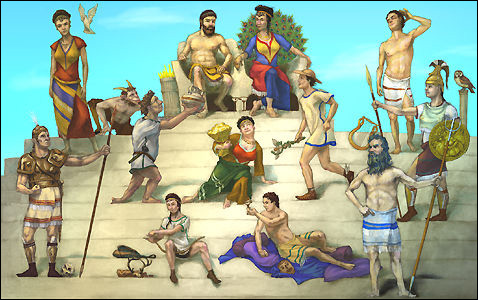
Scientists tell us
our brains work
with metaphors.
So it is no small wonder that
the US Supreme Court g(r)asped for
metaphoric help when trying to grapple
with the micro-bio-chemistry monster that
confronted them in AMP v. Myriad

Pray tell us,
is it more like strolling through the Garden of Eden and plucking a leaf off the Tree of Knowledge?

Or are we standing in the machine shop and whittling down the trunk until only cellulose in the form of a baseball bat remains?

Which rings more poetically true in the biochemistry quiz that vexes us?
Surely the gods will inform us of the correct answer by meme of the harmonically resonating spheres if only we carefully circle competing narratives and listen for the vibrations of the truer truth.
Ours is not to truly understand but rather to appear as if song-speaking from Olympian quarters.

This has always been the Herculean task of a Supreme.
Appearance is perception.
Perception is Truth.
We know an ultimate truth when we hear it.
The mortals beneath can bank on our sound logic.
If you are not in tune with the split metaphor way of thinking of English major Supremes, here is how the divide in AMP v. Myriad came into being:
The molecular composition known as "cDNA" appears to have been synthetically milled on the lathe of the life scientists and hence it is machine-shop "eligible".
However, the molecular composition known as "BRCAx" appears to have been naturally and simply plucked from Nature's Tree of Life and thus it is not a product of machine shop synthesis but rather a natural drop out from Mother Nature's loins, hence "ineligible".

Footnotes
(1) Transcript of Oral Hearings 4-15-2014
(2) The European view (not an Idiocracy?)
(3) Blood, Sweat & Isolataion? --too bad
(4) Debbie Does Disease Tech
(5) The Curious Concurrence of Justice Antonin Scalia
(6) The "Hercules Unchained" Metaphor
(7) If you patent a molecule, you sir are a "troll"
(8) Patent Docs looks back at Myriad Reactions
(9) More ... here, here, here, here, here,
(10) Recent blog posts ...

2 comments:
The metaphor of economic reason rings with disciplinarian truth:
"Adam Smith had criticized the concept of trade monopolies and portrayed them, along with industry collusions, as anticompetitive and against the public interest."
[in Comment section of:]--A Welcome Turn Away From Patents
http://umberttheunborn.blogspot.com/2013/08/should-god-sue-for-patent-infringement.html
Unbert-the-Unborn argues that the Intelligent Inventor in the Sky should sue ...
Post a Comment